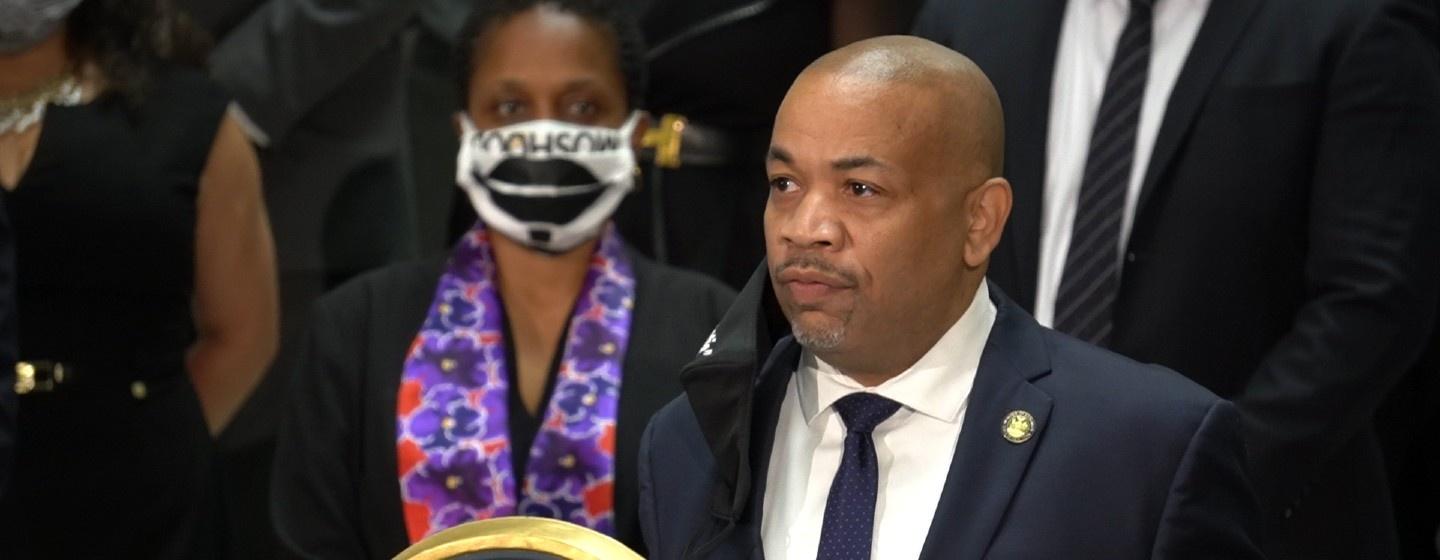Democrats in New York on Monday approved the first few bills of a package expected to pass this week in response to the death of George Floyd in Minneapolis and resulting protests that have since rocked cities across the state and nation.
The state Legislature is expected to approve the remaining items over the next two days in Albany, where some lawmakers appeared in person, while others joined via video chat.
Assembly Speaker Carl Heastie, a Democrat from the Bronx who was chosen five years ago as the first Black speaker of the state Assembly, said some of the bills lawmakers are set to approve this week have been considered for years, but never gained traction.
“From New York to Minneapolis, to cities across the globe, people everywhere are calling for action,” Heastie said. “They're tired of seeing people victimized by a system and culture that too often judges them by the color of their skin.”
The package of bills is the culmination of negotiations between the Assembly and Senate in recent weeks, after the death of George Floyd in Minneapolis sparked a series of protests in cities across the country, including New York City.
Many of the bills included in the package were already introduced, but amended ahead of this week’s vote to reflect input from lawmakers before passage.
Senate Majority Leader Andrea Stewart-Cousins, a Democrat from Westchester who was chosen as the first Black woman to lead the chamber in 2019, said the changes were long overdue, considering the string of other police-involved deaths in recent years.
“The horrific murder of George Floyd, the most recent in a long list of innocent people like Breonna Taylor, Ahmaud Arbery, Sean Reed, Tony McDade, and so many more, has led to a rightful outpouring of grief and anger,” Stewart-Cousins said.
“Black New Yorkers, like all residents of this state, deserve to know that their rights, and lives, are valued and protected by our justice system.”
The Legislature approved five bills Monday from the package, which includes 10 items expected to pass by the end of the day Wednesday.
The first bill, called the Eric Garner Anti-Chokehold Act, will formally ban the use of chokeholds by members of law enforcement, and any other form of obstructing a person’s airway that leads to serious injury or their death.
Using that technique will be a crime, charged as a class C felony, which carries up to 15 years in state prison.
The second bill will require the state court system to track data on the racial breakdown of misdemeanor charges and violations, including the address of the person charged, and where the alleged crime occurred.
The state court system will also be tasked with tracking how those cases turned out — whether the individual was sentenced, penalized, or had their case dismissed.
Another part of the bill will require all law enforcement agencies in the state to track and report data on arrest-related deaths, including the race of the individuals who died, where they lived, and how they were killed during the arrest.
The third bill creates a civil penalty for individuals who call the police on individuals of a protected class when there’s no immediate threat to person or property, or no evidence that a crime is being committed, or has been committed.
“These callers’ personal biases with other people has been the basis for many of those calls, and not for any particular threat that an individual may have presented to them,” said Assemblywoman Diana Richardson, the bill’s sponsor.
The legislation will empower the people who had the police called on them to sue the caller for damages, or any other appropriate relief as deemed necessary by the court.
Assemblyman Andy Goodell, R-Chautauqua, pushed back on the bill, saying it could inhibit witnesses from contacting police about potential crimes.
“We need to be extremely careful that we don’t make individuals who call with a tip liable for a lawsuit if the police following up on that tip then interview someone who then turns out not to be guilty of a crime,” Goodell said.
The fourth bill will guarantee that individuals have the right to record activities of law enforcement when that person is not under arrest. It will also protect the person’s right to maintain custody of that recording, meaning police wouldn’t be able to ask that it be deleted.
If a member of law enforcement tries to prevent someone from recording their activities, either physically or verbally, the person will have the right to sue that officer under the measure.
“These amateur photographers often shine a light on police brutality,” said Assemblyman Nick Perry, who sponsored the bill.
The final bill for Monday will require members of law enforcement to verbally report to their superior, within six hours, when they discharge their weapon while on duty in a situation where someone could be struck by a bullet. They’ll have to file a written report within two days.
Gov. Andrew Cuomo has said, in recent days, that he’ll sign each bill of the legislative package expected to be approved this week.
“If they pass the bills that we discussed, I will sign the bills and I will sign them as soon as they're passed,” Cuomo said Monday.



